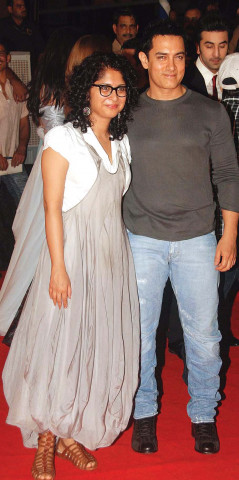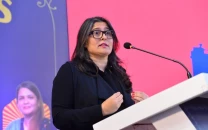Unrequited love, dirty linen and the monsoons
A talk with Kiran Rao at the London Film Festival the day after her film Dhobi Ghat is shown to great applause.

Unrequited love, dirty linen and the monsoons
Rao is not afraid to admit that her famous husband (who she controversially got involved with while he was still married and she was an assistant director on Lagaan) was not her first choice for a film that emerged out of her love affair with multi-layered Mumbai. “I wanted fresh, unknown actors so I could shoot easily on the streets without inviting too much attention. In fact most of the cast are not actors at all. Monica Dogra, the main female lead, is a singer. Kirti Malhotra, who plays Yasmin, is a stylist. Luckily most of Aamir’s scenes were indoors so we got away with it.”
Unusually, despite being the main draw, Aamir Khan’s ‘Arun’ appears almost overstated when viewed alongside spontaneous, honest performances from a novice cast which includes Smita Patil and Raj Babbar’s son. Prateik (he prefers not to use either parent’s surname) pulls off an unerringly heart-warming performance as Zohaib aka Munna, a young slum dweller with impossibly big city dreams spun tightly into a compact tin hut. His walls lined with film posters, Munna washes Mumbai’s dirty linen and serves as a link between its constantly moving inhabitants. Shai (Monica Dogra) returns to Mumbai to shoot pictures and becomes enraptured with Arun after a sozzled one-night stand. She befriends Munna, who, unused to attention from an uptown girl begins to long for more. Meanwhile, Arun, who is still hurting from a failed marriage, discovers a set of video tapes in his new home: visual letters from a young Muslim girl named Yasmin to her brother. As Arun’s obsession with Yasmin’s story grows, her life unravels before his eyes with lasting consequences.
The real star of Dhobi Ghat is not Aamir Khan but Kiran Rao’s intelligent, lyrical direction. She creates a Mumbai that is intimate, quiet and intermittently still in unexpected, off-guard moments. It is also equally bustling, noisy and fraught with unfulfilled love and ambition. She shoots it unexpectedly in old-fashioned 16 mm, which she says “is silly and romantic but I love it. It gives the film a lovely grain that I wanted it to have.” Rao captures Mumbai as a constantly shifting city, a microcosm of India’s cultures and classes, of insiders and outsiders who may think they can cross its invisible barriers, but are ultimately bound by the rules and regulations of their own social neighbourhoods, languages and financial standing.
I talk to Kiran Rao at an afternoon tea arranged by the London Film Festival the day after her film is shown to great applause. It has already wowed the critics at Toronto and the UK press is equally impressed.
Rao is far from classic Bollywood; she is new Mumbai. A mop of curly hair frames a cleanly scrubbed face; glasses perched squarely on her nose. She is animated and articulate when talking about her kind of cinema, which may be different from her husband’s but these variances she says make for an interesting marriage. She didn’t grow up seeing Bollywood films. Her cinematic influences are from wave: Tsai-Ming Liang from Taiwan and Wong Kar-wai from Hong Kong. She whispers these rehearsed answers to a range of journalists, somehow managing to make most of her repeated words seem genuine. But when you engage her with more provocative questions she rises to the challenge and you see her mind working quickly, independently. The conversation is peppered with references to her other half; it seems her passion is halved between cinema and her husband in equal measure.
But if Kiran Rao has lived in Aamir Khan’s shadow until now, quietly producing films like Peepli Live, Dhobi Ghat is her time to emerge from that shadow and take her rightful place on the world cinema stage. Watch out for this one; Kiran Rao is a director with a future.
Dhobi Ghat is currently doing the festival circuit and will release in January 2011.
The film could almost not have been made without Mumbai and the monsoon. What drew you to the city as the setting for your first film?
Mumbai encapsulates all the vitality of a contradictory country like India. I wanted to focus on the unending movement of city living; of life in a world of 11-month leases and having to live with the leftovers of other people’s lives. The monsoon typifies Mumbai. It is relentless and encompassing. So Dhobi Ghat is a collage of this city. It is about the contradictions of modern existence.
As a female director it is interesting that both the female characters in Dhobi Ghat wield cameras: Shai takes pictures and Yasmin keeps a video diary to send to her brother. The male characters are their muses. It seems a conscious decision to invert the male gaze and let the women be the auteur.
Exactly. It is the women who in essence tell the story, who make the picture. I suppose my perspective is shaped by my being a woman, how can it not be? In the example you speak of it was very obviously a mindful decision. But it is not something I do consciously all the time. When I’m asked what it feels like to be a female director, I have to say that it probably feels no different from being a male director. No one I have worked with has dealt with me differently. I never received any special privileges when I was working as an assistant director. But my experience of being a woman is necessarily going to come out in my work.
Dhobi Ghat constantly confronts class issues that are familiar across the sub-continent. It’s interesting that you take a staple of Bollywood cinema — the ‘rich girl and poor boy romance’ — and essentially show that class differences don’t allow it to happen. Shai finds it easy to slip into bed with Arun who is from her own background but can’t seem to acknowledge more than friendship from Munna
I wanted to show what makes people from different classes come together and also not come together. In Bollywood films class doesn’t matter and love conquers all. But in real life class is culturally ingrained in the fabric of our society and we can’t escape from it. The truth is there are differences and we can pretend that they don’t exist but is the rich girl really going to be able to deal with the implications of a romance with her dhobi?
You have said that your cinematic influences are not born in Bollywood. Do you feel that the rise of multiplexes with smaller screens has allowed for films like Dhobi Ghat to be made and seen? How disconnected do you feel from Hindi commercial cinema?
Multiplexes have definitely made films like mine possible. There is a lot more variety now in terms of what appeals to the urban audience. I made Dhobi Ghat for people like myself; it is the kind of film I would watch if someone else made it. I wouldn’t say that my style of filmmaking derives from Bollywood as such. When I was growing up in the 1980s, it was not really a great time for Hindi cinema. Films were violent and rough. And my parents wanted me to watch sanitised films about hippopotamuses! When TV came into our lives we were finally allowed to watch old Hindi films that were shown on Sundays. Hindi cinema has not been what I have grown up on. I think Bollywood is changing now. There is an infusion of new blood and ideas. Films look better and have better production values. But the writing still has to improve. I think Bollywood would benefit a lot if it invested in better writers.
So you and Aamir probably have major problems choosing a film to watch together...
Actually, while Aamir and I are obsessive about films he doesn’t really watch many. He’s a reader; he’s always reading books and I’m the one watching art house cinema and animation. Of course he has started watching a lot more films because of my interest, but he doesn’t really distinguish between types of cinema — he just likes engaging stories. We are both a bit obsessed with our work. We once made a pact to not talk about cinema after 9 pm in the house - it lasted one week.
Though Aamir Khan had to audition for you before you gave him the part of Arun, it seems his commercial cinema roots have detracted from his performance. He doesn’t appear quite at home in his character as say Prateik who is quite a discovery. Surprisingly, Aamir seems the least natural of the whole cast
Aamir comes with a lot of baggage from commercial cinema, so I had to temper the performance, peel off the layers. But it has been an amazing experience working with him as an actor. Remember, he has always acted in author backed roles and in Dhobi Ghat it is Prateik who occupies that space. He is the one everyone is rooting for. For a sub-continental audience seeing Aamir Khan in a film that doesn’t revolve around him is bound to be strange. ‘Arun’ is a much more damaged character than anything Aamir has played before. He is prickly on the outside, tender on the inside. But you tend to see the outside much more.
You and Aamir come from very different worlds. Generally speaking the public’s focus has been on him. Now that you are finally coming into your own professionally, how are you going to balance the relationship and work?
Aamir is a really regular, normal sort of guy. He is down-to-earth and humble. We have a very equal relationship. He has always loved me for who I am and been supportive of what I do. He knew I wasn’t a glamorous actor or model. I was never going to be a typical star wife. I have no interest in these big Mumbai parties. He has never asked me to fit into a box or suit someone else’s idea of what his wife should be.
Published in The Express Tribune, October 17th, 2010.



















COMMENTS
Comments are moderated and generally will be posted if they are on-topic and not abusive.
For more information, please see our Comments FAQ